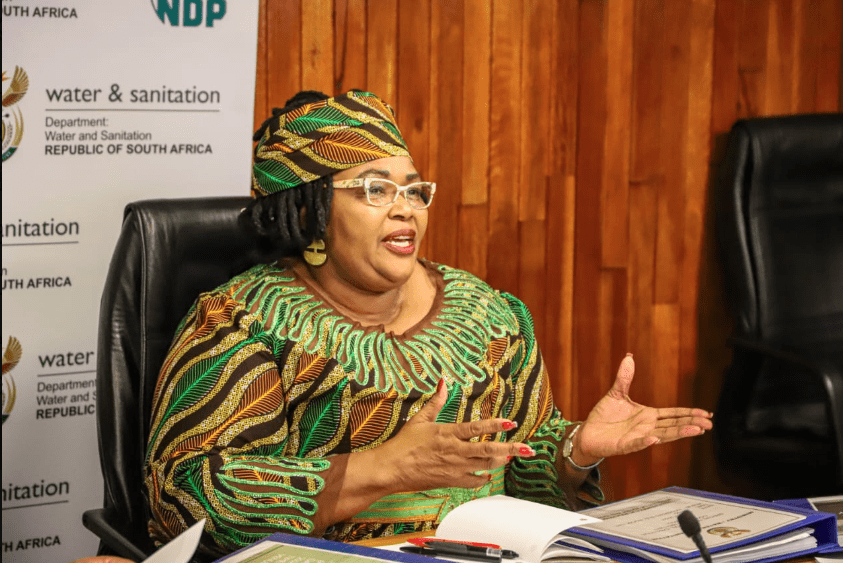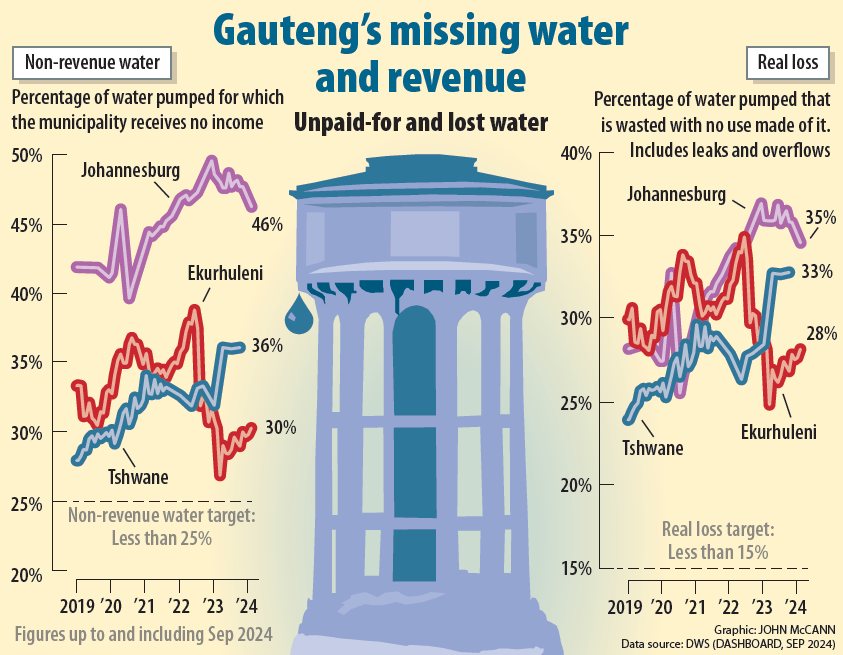
Water and sanitation minister, Pemmy Majodina. (DWS/X)
Gauteng’s worsening water crisis is the result of municipalities failing to cooperate with water conservation measures, allowing over-consumption and ignoring infrastructure maintenance, according to Water and Sanitation Minister Pemmy Majodina.
Speaking during a briefing to the parliamentary portfolio committee on water and sanitation on Tuesday night, she said that what municipalities were experiencing was “self-inflicted pain”.
Majodina said that Gauteng and KwaZulu-Natal, particularly eThekwini metro, were battling increasing water supply disruptions, but “the entire province of Gauteng is over-consuming water”.
Referencing that the global average water consumption is 173 litres per person a day, Majodina said that “ in Gauteng, they go up to 290-something and we said that this is abnormal and something must be done in Gauteng.
“We said there’s lots of unaccounted-for water, non-revenue water. We met all the municipalities in Gauteng, the premier and the department of cooperative governance and traditional affairs to alert them that soon Gauteng will be running out of water and the only thing we can do to rescue Gauteng … is to put level 1 restrictions so that Gauteng must do the right thing.”
Since the mild restrictions were imposed in September, there have been more than three meetings to check whether the situation had improved. “Unfortunately, we have to be honest, there is no change in terms of Gauteng doing the right thing,” Majodina said.
“We gave them four doable things. The first one was for Gauteng to immediately close the leaks. This is doable — in the next 72 hours, it can be done. The second one was to disconnect illegal connections. That is doable. We said to Gauteng, you must bill people in the correct manner. That is doable.
Gauteng is not in a drought. “The water supply disruptions in Gauteng are caused by demand that exceeds supply, not by dams that are not having enough water,” she said.
The province can change the situation “if there is political and management will” to do so and Rand Water “is doing what is expected to be done”.
She said peak demand is caused by Gauteng “using more water than it is supposed to. Rand Water is extracting enough water to give to Gauteng.”
The department sets a limit on raw water extraction and Rand Water is taking the maximum amount, the minister said. The bulk water utility would only be able to extract additional water after Phase 2 of the Lesotho Highlands Water Project is completed in 2028.

The water crisis, driven by population and economic growth in the country’s economic hub, was anticipated by the department’s planners in the 1980s.
“There has also been an increase in the non-revenue water in municipal systems,” said Majodina. “That includes illegal connections, unbilled connections as well as physical losses and leaks from municipal water systems.”
Non-revenue water is the volume of water that is pumped but for which the municipality receives no income. The target for municipalities in South Africa is less than 25% but the actual amount of non-revenue is much higher — 46% in the City of Johannesburg, 30% in the City of Ekurhuleni and 36% in the City of Tshwane.
According to the department’s dashboard for a water secure Gauteng, annually reported leaks vary from about 40 000 in Tshwane and Ekurhuleni and 100 000 in Johannesburg, translating to about 500 leaks reported in the Gauteng metros daily. “A back-office process is required to confirm that work has been done satisfactorily prior to closing works orders,” the document said.
Sipho Mosai, the chief executive of Rand Water, told the portfolio committee that it was licensed to abstract 1 347 million cubic metres of raw water from the Vaal Dam. “As it is Rand Water is over-abstracting at 1 800 million cubic metres per annum.
“The department has given us a temporary licence to abstract at this level but in that licence, it’s very clear that the department wants us to come to a figure of 1 600 million cubic metres per annum,” he said.
“If anything, we should be talking about a reduction of the water that we are already abstracting from the Vaal Dam, which is part of the Integrated Vaal River System.”
Mosai said he received correspondence from the department’s director general, Sean Phillips, to that effect, this week. “He has indicated in that letter that between 2024 and 2028, we will only be allowed to extract 1 600 cubic metres … because of the delay in the Lesotho Highlands Water Project and because of climate change; we can’t empty the dams.
The implementation of Phase 2 was delayed for nine years.
“When Lesotho Highlands [Phase 2] is coming into effect, we should only be taking 1 840 million cubic metres per annum. Already from time to time, we’re exceeding that number,” Mosai pointed out.
The situation called for collective leadership. “We have reached the limit of the temporary licence; we are over-abstracting so we are left with no option but to implement water conservation and demand management measures like other metros in South Africa and other cities around the world,” he said.
On average, Rand Water supplies 4 500 million litres of water a day “but what we’ve seen is a worrying trend that even in winter, we’re still pushing peak demands. As we speak we are doing 5 000 [to] 5 200 megalitres a day,” he said.
He added that too much water going through the filters clogs the filters faster.
Non-revenue water in Gauteng is hovering close to 50%, whereas in Cape Town it is about 28%. “If the people of the Western Cape can go at about 164 litres per person per day, so can we here in Gauteng.”
Rand Water’s board chairperson, Ramateu Monyokolo, said its main strategic risk is the deteriorating availability, reliability and quality of electricity, followed by encroachment over pipelines, servitudes and properties; the unsustainability of the supply of potable water; deterioration of the financial health of its customers; delays in infrastructure project implement and completion; and unpredictable weather patterns and and extreme events.
Another risk is the deterioration of the financial health of Rand Water itself because of non-revenue water, which “stands at 49% and that is superfluous demand and their failure [municipalities] to pay that debt is now about R7.8 billion,” while the debtors’ days have increased from 35 in 2014 to 100-plus days.
“Why is the legislation allowing water boards to supply water to municipalities that are not paying them?” Mosai asked. “Municipalities are getting an equitable share to pay for the bulk purchases; they get paid all the time but that money is not passed through.”
He also raised the issue of water boards being closed. “We used to have 19 water boards when I came to the industry; there’s about nine left. We then transfer the debt to another water board … We are not allowed by legislation to completely shut the water supply.”
Rand Water’s Monyokolo said the municipalities don’t own their problems and instead use political leaders to put pressure on the water utility.
“We’ve had 46 meetings with municipalities, the province, including our ministry and the department throughout Gauteng. The meetings dealt with inadequate infrastructure in municipalities. The minister has mentioned that municipalities don’t have pumping capacity [and have] inadequate storage capacity.
“We have also raised the issue of the leakages that are there, the non-revenue water, which is increasing in municipalities, which leads to phantom demand because that demand is not proper demand because we lose 49% of the water.”
Mosai said the top five non-performing or defaulting municipalities owed a combined total of R3 832 billion for long-outstanding arrear debt, including three in Gauteng — Emfuleni (R1.1 billion), Merafong (R980 million) and Rand West (R542 million).
Rand Water has a debt-relief programme for 10 municipalities, yet only two are honouring these agreements: the City of Tshwane and Mogale City local municipality.
Those not honouring the payment arrangements include Johannesburg Water and the City of Ekurhuleni.
The Mail & Guardian
mg.co.za
